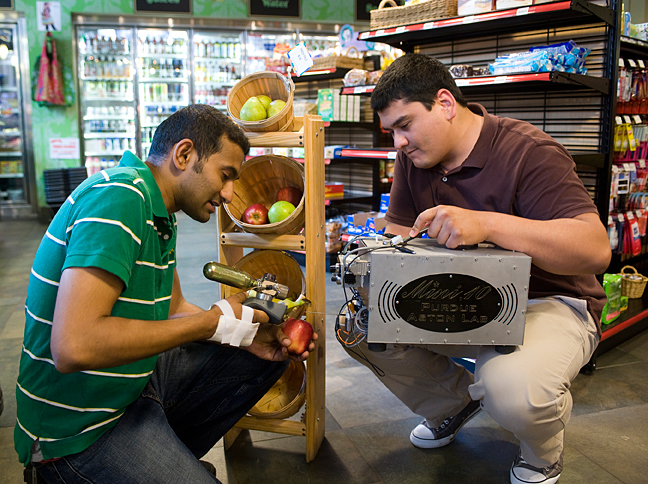Ouyang's Miniature Mass Spectrometer Research Garnering Media Focus
Ouyang's Miniature Mass Spectrometer Research Garnering Media Focus
| Magazine Section: | Innovate |
|---|---|
| College or School: | CoE |
| Article Type: | Article |
In the technology's first venture out of the lab, it successfully identified specific chemical residues on apples and oranges in a matter of minutes right in the produce section without having to peel or otherwise prepare a sample of the fruit. The team used the miniature mass spectrometer - that some have likened to Star Trek's "tricorder" - to test for a fungicide on oranges and a scald inhibitor on apples.

"We're trying to take powerful, sophisticated instruments out of the lab and into the real environment where they could help monitor fresh produce all along the supply chain from production and supply to the consumers," said Cooks, who is co-founder of Purdue's Center for Analytical Instrumentation Development. "This technology has the capability of testing for bacteria as well, like E. coli or salmonella, and it only takes a matter of minutes as opposed to hours or even days for a standard laboratory test."
Mass spectrometry is a commonly used analysis method known for its sensitivity and accuracy; however, most available mass spectrometers require that a sample be specially prepared and placed in a vacuum chamber for analysis. Cooks and his team developed a technique, called ambient ionization, that allows critical steps to be performed in the air or directly on surfaces outside of a mass spectrometer. Molecules from the sample's surface are then vacuumed into the equipment for analysis.
Conventional mass spectrometers also are cumbersome instruments that weigh more than 300 pounds. The miniature mass spectrometer Cooks' team developed, called the mini 10.5, is a handheld device roughly the size of shoebox that weighs 22 pounds.
For the full article by Elizabeth Gardner, see the Purdue Newsroom.
Comments